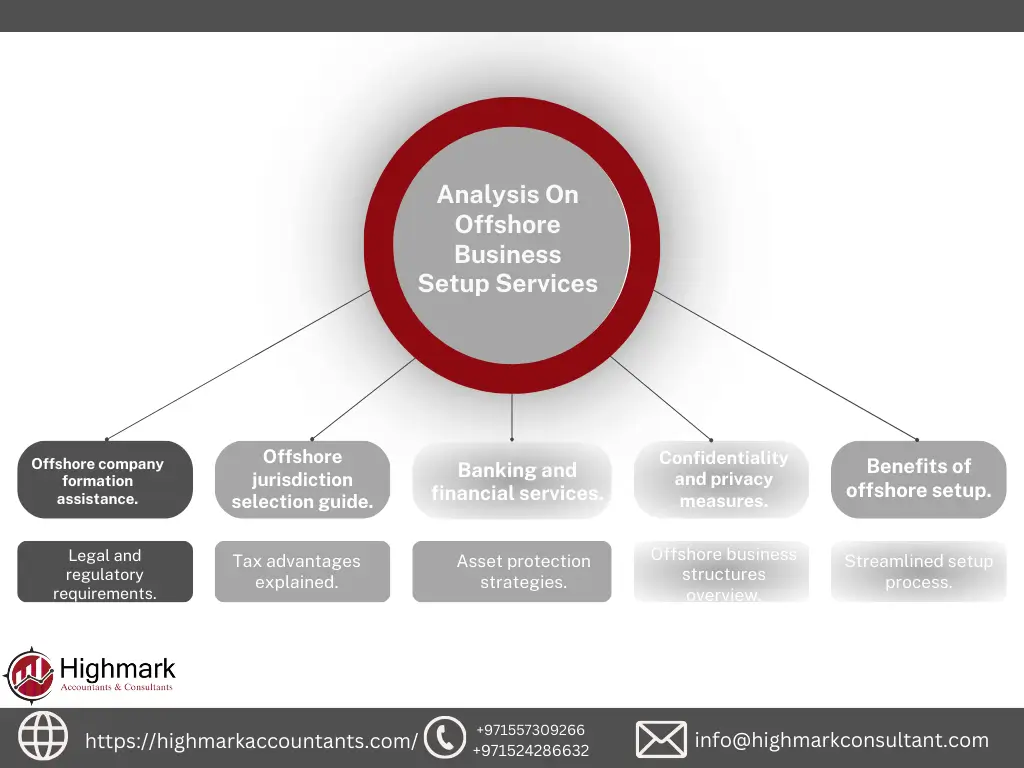Offshore Company Formations Profiles: Actual Wins
Wiki Article
Demystifying Offshore Business Formations: How They Operate and What to Expect
Offshore business formations can appear facility and enigmatic. Offshore Company Formations. These entities, typically established for tax obligation advantages and privacy, run under distinct legal structures. Business owners may locate themselves maneuvering through a maze of laws and compliance demands. Recognizing the ins and outs is vital for success. What are the actual benefits? What are the possible risks? A closer exam discloses the nuances that can influence decision-making considerablyRecognizing Offshore Business: Kinds and interpretations
Offshore companies are entities established in a jurisdiction beyond an individual's or organization's primary country of residence, typically for objectives related to tax optimization, asset defense, or regulative benefits. These business can take various kinds, including minimal responsibility firms (LLCs), global company firms (IBCs), and offshore depends on. Each kind serves certain functions and attract various demands.Restricted responsibility firms offer proprietors with defense from individual obligation, while global organization firms are prominent for their adaptability and minimal coverage demands. Offshore trust funds, on the various other hand, are used mainly for estate planning and property defense.
The choice of territory substantially affects the business's procedures, as some places provide more beneficial legal frameworks and personal privacy protections. Offshore Company Formations. Understanding the differences in between these types is essential for people and organizations thinking about offshore frameworks, as each option brings different ramifications for administration and compliance
The Benefits of Developing an Offshore Firm
Developing an overseas company can give many advantages, specifically for those seeking to boost their monetary strategies and protect their properties. One substantial benefit is tax obligation optimization; many territories provide favorable tax rates or exceptions, allowing businesses to maintain even more profits. Furthermore, offshore business can offer a layer of privacy, securing the identifications of owners and shareholders from public scrutiny.Another advantage is asset defense. By positioning properties in an overseas entity, people can guard their wealth from prospective legal insurance claims or political instability in their home nations. This framework also helps with global organization procedures, enabling simpler accessibility to diverse customers and international markets.
In addition, the facility of an overseas firm can boost reputation and prestige, interesting clients that value global business practices. On the whole, these benefits make offshore business formations an attractive option for services and people going for economic growth and safety.
Secret Factors To Consider Before Developing an Offshore Entity
Prior to forming an offshore entity, a number of important variables need to be evaluated. Lawful compliance needs, tax implications and benefits, in addition to territory option, play a considerable function in the decision-making procedure. Understanding these considerations can assist people and businesses browse the intricacies of overseas company formations efficiently.
Lawful Conformity Requirements
When considering the formation of an offshore entity, comprehending legal conformity needs is important to ensure adherence to both international and neighborhood laws. Possible company proprietors need to familiarize themselves with guidelines controling firm registration, reporting commitments, and operational requirements in the selected jurisdiction. This consists of confirming the legal requirements for directors and investors, in addition to guaranteeing conformity with anti-money laundering (AML) and know-your-customer (KYC) guidelines. In addition, businesses ought to stay familiar with any type of licensing needs certain to their sector. Engaging regional legal and economists can provide useful insights, guaranteeing that all needed documentation is prepared and submitted properly. Eventually, thorough understanding of legal compliance aids mitigate risks and fosters a sustainable offshore operation.Tax Ramifications and Advantages
Countless local business owner consider the tax effects and benefits of forming an offshore entity as an important consider their decision-making procedure. Offshore business can supply substantial tax obligation advantages, such as minimized business tax obligation rates, exception from particular neighborhood tax obligations, and the capability to delay taxes on foreign income. These advantages can cause improved earnings and capital, making overseas frameworks appealing for worldwide company operations. In addition, the possibility for tax obligation treaties might further decrease tax obligation obligations. Nonetheless, it is necessary for entrepreneur to understand the complexities involved, including conformity with both neighborhood and worldwide tax obligation policies. Engaging with tax specialists is advisable to browse these complexities effectively and assure excellent tax planning approaches.Territory Option Factors
What elements should one think about when choosing a territory for overseas business development? Trick factors to consider include tax obligation performance, governing setting, and political security. Territories with favorable tax programs can substantially influence profitability. The regulatory landscape should provide flexibility and convenience of compliance, permitting for efficient company procedures. Political security is vital, as it ensures the security of possessions and continuity of operations. Additionally, the reputation of the jurisdiction can influence client trust and business relationships. Ease of access to banking solutions and the schedule of expert assistance solutions are additionally vital. Finally, understanding local legislations pertaining to reporting, privacy, and possession demands is vital to establish that the overseas entity straightens with business owner's objectives and lawful obligations.The Refine of Establishing an Offshore Business
Establishing an offshore firm includes a series of strategic actions that need careful preparation and compliance with international laws. An individual should pick a suitable territory that lines up with their business goals and offers positive tax advantages. Complying with territory option, the following action is to select an unique business name and prepare the essential paperwork, consisting of articles of consolidation and investor agreements.As soon as the documents prepares, it has to be submitted to the appropriate authorities in addition to the required charges. After authorization, the business will get a certificate of incorporation, formally developing its lawful existence. The specific have to after that open a corporate bank account to facilitate monetary transactions.
Finally, preserving an offshore firm entails adhering to ongoing conformity needs, such as annual coverage and tax commitments, which differ by territory. As a result, comprehending each action is essential for a successful offshore company formation.
Governing and lawful Framework for Offshore Companies
While establishing an overseas company can supply considerable benefits, it is important to steer via the complicated legal and governing structure that regulates such entities. Each jurisdiction has its very own set of regulations that dictate whatever from company development to taxation and compliance needs. These policies are made to avoid unlawful activities, such as cash laundering and tax obligation evasion, and typically require thorough documents and transparency.Crucial element of this framework consist of the necessity of assigning regional directors, preserving a registered office, and sticking to yearly my latest blog post reporting responsibilities. In addition, many territories impose particular licensing demands for sure service activities. Recognizing these legal stipulations is critical for ensuring compliance and mitigating risks connected with fines or legal disagreements. Subsequently, engaging with attorneys who concentrate on offshore business can assist in navigating with this detailed landscape, ultimately assisting in a successful and certified offshore organization procedure.
Common False Impressions Regarding Offshore Firms
Numerous individuals hold mistaken beliefs concerning offshore business, frequently corresponding them with tax obligation evasion and prohibited activities. However, it is necessary to acknowledge that these entities can operate legitimately within a framework created for legitimate business methods. Clearing up the lawful status of offshore firms can aid eliminate these myths and promote an extra accurate understanding of their function.Tax Evasion Misconceptions
Despite the growing appeal of offshore firms, misconceptions about their usage for tax evasion continue. Numerous individuals erroneously believe that establishing an overseas entity is solely a way to stay clear of taxes. Offshore business are often used for legit functions, such as possession defense, worldwide organization development, and financial investment diversity. The assumption that all overseas tasks equate to immoral tax obligation evasion neglects the intricacies of global tax guidelines and conformity needs. Additionally, the huge majority of overseas jurisdictions have executed procedures to battle tax obligation evasion, promoting transparency and information exchange. This mischaracterization can deter genuine services and capitalists from exploring the prospective advantages of offshore firm formations while perpetuating a negative stigma bordering these entities.Legal Standing Clarified
The legal condition of offshore firms is usually misunderstood, causing a range of misconceptions. Several believe these entities operate in a legal gray area, thinking they are naturally unlawful or underhanded. In truth, overseas business are genuine organizations created under the legislations of specific jurisdictions, designed for different reasons, including possession defense and market growth. Another common misconception is that offshore firms avert tax obligations totally; however, they go through the regulations and tax obligation obligations of their home nations. Furthermore, some people believe that overseas firms can be easily manipulated for money laundering or unlawful tasks. While abuse can take place, most territories impose stringent compliance and transparency regulations to mitigate such threats, making certain that overseas companies operate within lawful frameworks.
Handling and Operating Your Offshore Company Efficiently
Successfully taking care of and running an offshore business needs a critical method that stabilizes compliance with regional policies and the search of organization goals. Successful overseas administration includes understanding the jurisdiction's tax legislations, reporting demands, and operational guidelines. Employing local professionals, such as accountants and legal advisors, can provide indispensable insights into traversing these intricacies.In addition, developing clear communication channels and operational procedures is vital for preserving performance. Utilizing modern technology for task monitoring and cooperation can improve efficiency, while regular performance reviews guarantee placement with critical purposes.
Additionally, preserving robust financial documents is crucial, as openness promotes count on with stakeholders and complies with global requirements. Being versatile to changes in regulation or market conditions permits offshore firms to pivot efficiently, assuring long-lasting sustainability and development. By adhering to these concepts, local business owner can make the most of the advantages of their offshore endeavors while mitigating threats.
Often Asked Inquiries
Exactly how Much Does It Price to Maintain an Offshore Company Annually?
The expense to keep an overseas business annually varies considerably, commonly varying from $1,000 to $5,000, depending on territory, solutions required, and compliance obligations. It is important to take into consideration extra costs for specific demands.Can I Open a Financial Institution Account for My Offshore Firm Remotely?
Opening a savings account for an offshore business from another location is usually possible. Demands may vary by jurisdiction, usually demanding documents and confirmation procedures, which can make complex the remote application experience for people.Are There Certain Countries Understood for Easier Offshore Business Formations?
Specific countries, such as Belize, Seychelles, and the British Virgin Islands, are renowned for their streamlined procedures and desirable guidelines pertaining to overseas company developments, drawing in entrepreneurs looking for efficiency and confidentiality in organization operations.
What Sorts of Services Are Finest Suited for Offshore Firms?
Specific organizations, such as investment, consultancy, and shopping firms, often take advantage of overseas companies as Web Site a result of tax benefits, privacy, and regulative flexibility - Offshore Company Formations. These entities normally thrive in territories that promote desirable company settingsHow Can I Make Sure Conformity With Local Legislations When Running Offshore?
To guarantee conformity with neighborhood legislations when running offshore, it is necessary to involve lawful experts, carry out detailed study on territory guidelines, and preserve clear economic documents, consequently decreasing dangers connected with non-compliance.
Report this wiki page